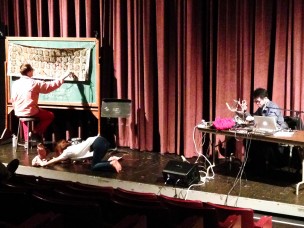
Every once in a while, you see something you simply cannot comprehend. It’s not that it’s over your head, confusing, or made poorly. It just defies any sort of explanation.
Japanese composer Tomomi Adachi specializes in this brand of bizarre, avant-garde art. Surrealism, Dadaism, and futurism all blend in his work to create something totally brilliant and at the same time utterly nonsensical. Performing to a small audience at the CFA Hall on Thursday night, Adachi forced viewers to wrestle with their conceptions of sound.
Adachi’s performance didn’t even begin with him onstage. Sitting in front of a board covered with circuit boards and wires, Peter Blasser GRAD manipulated bass-heavy ambient tones by alternating wires in the two dozen or so boards. Dancer Ayako Kataoka, at times herself attached to wires, twirled and convulsed on stage, her movements seemingly altering the sounds. After several minutes, Adachi joined them, sampling sounds that came out of an amplified metal box full of wires, essentially a man-made electric guitar.
From there, Adachi jumped into his solo pieces, which were more conceptual. It’s unclear what exactly inspired any of these pieces, but each had its own unique voice. The first, “Torturing Twitter,” was a spoken-word piece in which Adachi read, in real-time, five Twitter hashtag feeds: power, economy, war, cooking, and sex. Each feed was introduced gradually, and what began with tweets about President Obama eventually became a flood of porn. It was a fascinating, if not humorous, presentation of what people tweet about on a daily basis.
The second piece, “Another Ear Stretching,” was by far the most interactive. A video of Adachi, projected on a screen, instructed viewers to move as ambient and natural sounds played. In essence, if we followed Adachi’s directions, we would manipulate the way that we heard the sounds. If we placed our hands against our ears, the sound became hollow and muffled. If we turned our heads to the right, the sound to the left became drowned out.
The third piece, which wasn’t introduced with a title, was not dissimilar from the prelude, as Adachi once again used his strange string instrument to create dissonance. Here, as with the first piece, Adachi displayed an interest in found objects; the instrument of choice, while certainly functioning, seemed cobbled together with woodblocks and strings.
“Voice Sound Poetry Form Ended With X,” a Dadaist sound poem, was one of the stranger pieces of the night. For about eight minutes, Adachi repeated patterns of nonsensical sounds. Some were vocal (“eees” and “oohs”), while others were more guttural, like the clicking of his tongue. In any case, the poem became an odd, ambient composition as the sounds blended into each other. The piece ran a tad long, but it was nonetheless an interesting way to examine the nature of rhythm and language.
The final piece, “Voice and Infrared Sensor Shirt,” was the most exciting. Beginning with a sampling of ambient sound waves, Adachi then put on a collared shirt covered in microphones and sensors. At this point, his entire body became an instrument, each motion drastically affecting the sound. A tongue-click followed by an upward arm motion might play the sound in reverse. Another motion might raise the pitch. Even the act of putting on and taking off this sound-shirt produced specific, high-pitched sounds.
This was, in short, a performance unlike anything else. Many of the performances forced us to interrogate our own understandings of sound. A piece like “Another Ear Stretching” revealed how our bodies play a role in the creation and intake of sound. “Voice Sound Poetry Form Ended With X,” by making poetry out of nonsense, made clear that words are simply constructions of other sounds. Everything here, however enigmatic, seemed to have an inherent purpose. It was one of the strangest nights of my life, but it was also one of the most thought-provoking. And therein lies Tomomi Adachi’s genius: his performances, though dense at first, stay with you. They crawl their way into your subconscious and make you wrestle with your environment. It was a performance that could only have been seen (or, indeed, heard) to be believed.



Leave a Reply